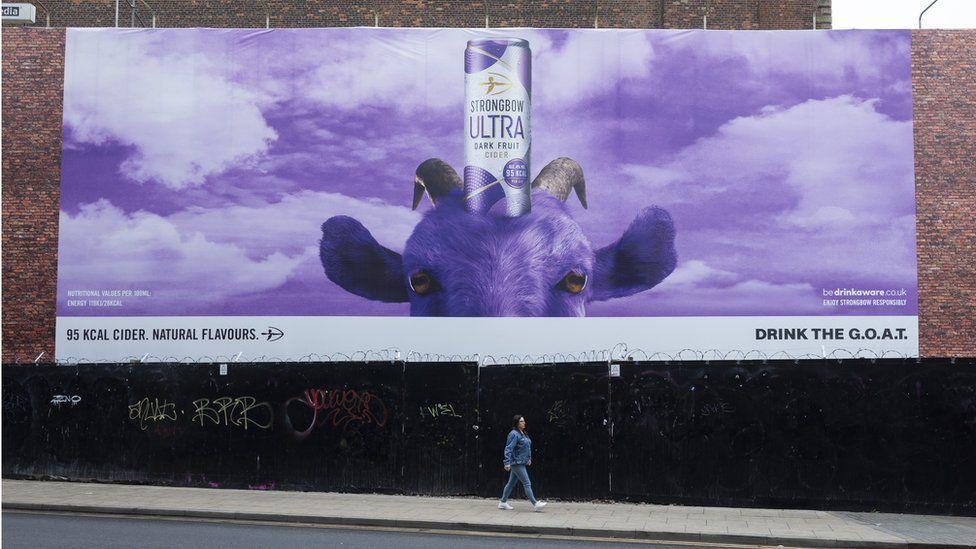Africa-Press – Lesotho. Campaigner Charlotte Gage says that the outdoor adverts you see on billboards and bus stops should all be removed. “These ads are in the public space without any consultation about what is shown on them,” she says.
“Plus they cause light pollution, and the ads are for things people can’t afford, or don’t need.
” Ms Gage is the network director of UK pressure group Adfree Cities, which wants a complete ban on all outdoor corporate advertising.
This would also apply to the sides of buses, and on the London Underground and other rail and metro systems. If you think this is a fanciful aim, then you might need to think again, as it has already happened in a few places around the world.
As far back as 2006, the giant Brazilian city of Sao Paulo, the largest in the southern hemisphere, banned all forms of outdoor advertising. Under the so-called Clean City Law, more than 15,000 billboards were subsequently removed, plus 300,000 store signs that were considered to be too large.
The French city of Grenoble followed suit in 2014. Its Assistant Mayor Lucile Lheureux explained at the time that the advertising firms wanted to upgrade their billboards to digital screens and “we don’t want our city’s children bombarded with animated advertising on TV screens in the street”.
More recently, Amsterdam, the capital of the Netherlands, banned some outdoor adverts last year – those for petrol and diesel-fuelled cars and air travel.
And this March, Bristol City Council banned outdoor adverts for gambling firms, junk food, alcohol and payday loans, but only on the advertising spaces that it owns, including bus shelters and billboards. Norwich City Council is exploring a similar move after councillors last year voted in favour.
Ms Gage says that while there are “ethical issues with junk food ads, pay day loans and high-carbon products [in particular], people would rather see community ads and art rather than have multi-billion dollar companies putting logos and images everywhere”.
She adds: “We’re not saying people shouldn’t own cars or eat burgers, but we know there’s a direct correlation between seeing ads and purchasing these products.
” Ms Gage adds that resistance to such “sight pollution” is growing in the UK.
Adfree Cities, which was set up in 2020, now supports a network of eight community groups across the country – all opposed to outdoor corporate advertising.
These include Adblock Bristol, which claims to have successfully campaigned against a number of proposed outdoor advertising sites being given planning permission in the city. Unsurprisingly, the outdoor advertising industry, which calls its sector Out of Home (OOH), strongly defends itself.
Tim Lumb, from the trade body Outsmart, points out that adverts “contribute a significant amount of money every year to the transport authorities and local councils through rent and business rates”.
He adds: “In a free society businesses have the right to advertise their wares, and individual citizens are not the helpless, brainless automatons that Adfree Cities considers them to be.
“Individuals make free and informed decisions about their spending choices, and pursue whatever they consider to be their ‘good life’, safe in the knowledge that advertising in the UK, including OOH, is appropriately regulated to ensure it is legal, decent, honest and truthful.
Meanwhile, a spokeswoman for another trade organisation, the Advertising Association, says that “all advertising plays a crucial role in brand competition, drives product innovation, and fuels economic growth”.
Yet some anti-advertising groups have been resorting to direct action, such as covering over billboards and other outdoor adverts. These include some membership groups of Adfree Cities, including Adblock Lambeth in London and Adblock Norwich.
Brandalism, a collective of activists, is another such organisation. It particularly targets adverts promoting cars, airlines and energy firms, such as putting up fake billboard posters of cars stuck in traffic jams, or altering legitimate posters to call for the banning of fossil fuels.
“We want to question the legitimacy of corporate outdoor adverting and draw attention to the impact they can have on social issues, mental health, wellbeing, the climate, and the communication of public space,” says Brandalism’s Tona Merriman, who is using a pseudonym.
New Economy is a new series exploring how businesses, trade, economies and working life are changing fast. “There’s a growing popularity of people using the tactic of ad hacking, and altering commercial ads posters, or putting satirical ads over them.
We see [what we do] as a right of reply to corporate messaging. If they are allowed to get the message out, the public has a right to reply to those ads.
” Mr Lumb says that Brandalism’s approach is “essentially vandalism and illegal, not to mention a public safety issue. And the reposting and occasional repair costs of Brandalism run into thousands of pounds each year. ”
Still, some experts say that banning certain outdoor adverts may be a good idea, such as Dr Nathan Critchlow, research fellow at Institute for Social Marketing and Health at the University of Stirling.
“There is consistent evidence that exposure to marketing for unhealthy commodities – for example advertising for alcohol or food and drinks high in fat, salt, or sugar – is associated with consumption, including among children and young people,” he says.
He points to the impact of Transport for London’s ban on such adverts since 2019 across its entire network of tube and overground trains, buses and trams.
A study last month found that the policy had prevented almost 100,000 obesity cases. Ms Gage says that instead of big adverts, “we’d rather see community arts, murals, local projects, and renewed green spaces”.
For More News And Analysis About Lesotho Follow Africa-Press






